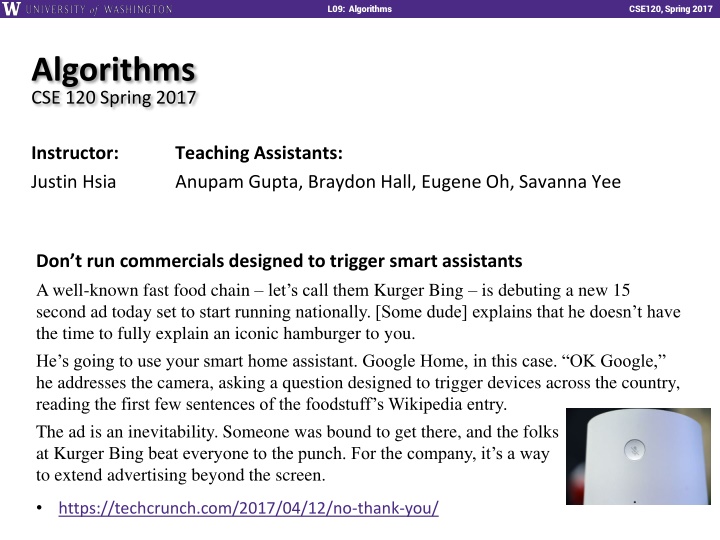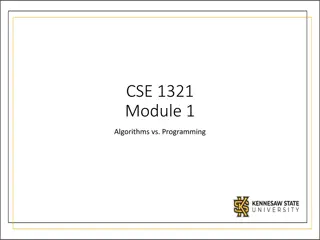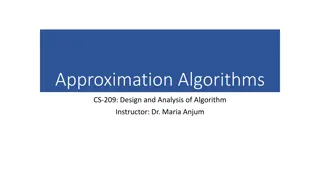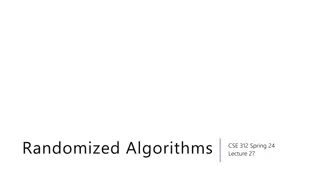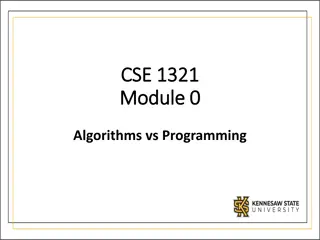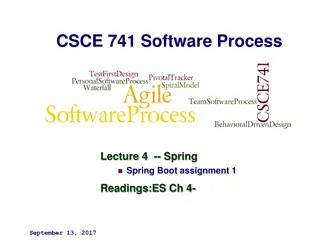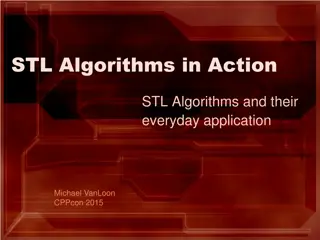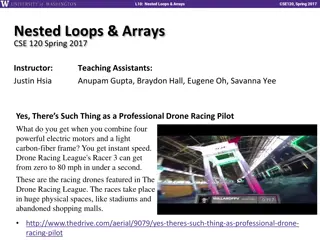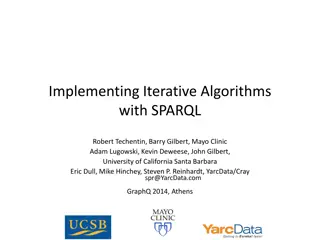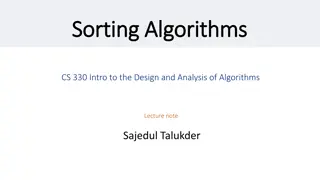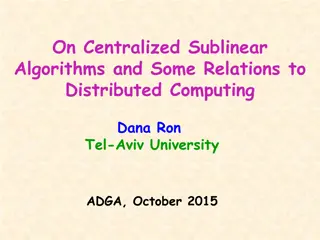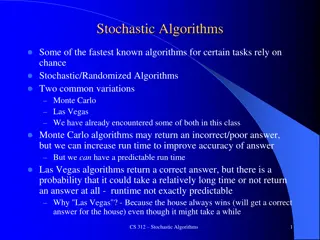Algorithms in CSE120 Spring 2017
Algorithms play a crucial role in computer science, and this content provides insights into their definition, examples, and applications in solving computational problems. It covers the concept of algorithms, their historical significance, and their use in transforming input into output. The content explores the relationship between computational procedures and desired input/output, emphasizing the importance of algorithms in problem-solving. Additionally, it delves into early algorithms that existed before the age of computers, showcasing the evolution of algorithmic thinking over time.
Download Presentation

Please find below an Image/Link to download the presentation.
The content on the website is provided AS IS for your information and personal use only. It may not be sold, licensed, or shared on other websites without obtaining consent from the author.If you encounter any issues during the download, it is possible that the publisher has removed the file from their server.
You are allowed to download the files provided on this website for personal or commercial use, subject to the condition that they are used lawfully. All files are the property of their respective owners.
The content on the website is provided AS IS for your information and personal use only. It may not be sold, licensed, or shared on other websites without obtaining consent from the author.
E N D
Presentation Transcript
L09: Algorithms CSE120, Spring 2017 Algorithms CSE 120 Spring 2017 Instructor: Justin Hsia Teaching Assistants: Anupam Gupta, Braydon Hall, Eugene Oh, Savanna Yee Don t run commercials designed to trigger smart assistants A well-known fast food chain let s call them Kurger Bing is debuting a new 15 second ad today set to start running nationally. [Some dude] explains that he doesn t have the time to fully explain an iconic hamburger to you. He s going to use your smart home assistant. Google Home, in this case. OK Google, he addresses the camera, asking a question designed to trigger devices across the country, reading the first few sentences of the foodstuff s Wikipedia entry. The ad is an inevitability. Someone was bound to get there, and the folks at Kurger Bing beat everyone to the punch. For the company, it s a way to extend advertising beyond the screen. https://techcrunch.com/2017/04/12/no-thank-you/
L09: Algorithms CSE120, Spring 2017 Administrivia Assignments: Jumping Monster due Saturday (4/15) Mice and Predator due Sunday (4/16) Creativity Planning due Tuesday (4/18) Find a partner, come up with two proposed programs 2
L09: Algorithms CSE120, Spring 2017 Outline Algorithms Examples of Algorithms Specifying Algorithms 3
L09: Algorithms CSE120, Spring 2017 Definition An algorithm is any well-defined computational procedure that takes some value, or set of values, as input and produces some value, or set of values, as output. An algorithm is thus a sequence of computational stepsthat transform the input into the output. From textbook Introduction to Algorithms (link) Algorithm (well-defined computational procedure) Inputs Outputs 4
L09: Algorithms CSE120, Spring 2017 Computational Problems Can think of an algorithm as a tool for solving a computational problem The problem statement specifies desired input/output (I/O) relationship The algorithm describes a specific computational procedure that gives you the desired input/output (I/O) relationship Example: Sorting is a computational problem Problem statement: Given a sequence of numbers, put them in order Example I/O: [1, 9, 3, 6, 2] [1, 2, 3, 6, 9] 5
L09: Algorithms CSE120, Spring 2017 Early Algorithms The concept of algorithms pre-dates computers Dances, ceremonies, recipes, and building instructions are all conceptually similar to algorithms Mathematical algorithms go way back: Babylonians defined many fundamental procedures ~3600 years ago, more formal algorithms in Ancient Greece Al-Khwarizmi laid out many algorithms for computation using decimal numbers You implicitly use hundreds of numerical algorithms! Nature runs algorithms (e.g. genes and development) 6
L09: Algorithms CSE120, Spring 2017 Properties of Algorithms Algorithms can be combined to make new algorithms It helps to know standard algorithms Building from correct algorithms helps ensure correctness There are many algorithms to solve the same computational problem Developing a new algorithm to solve a problem can lead to insight about the problem Example: 3SUM Given a list of ? real numbers, are there 3SUM New algorithm in 2014 New algorithm in 2014 three numbers in the list that sum to zero? New algorithm in 2014 broke supposed speed barrier 7
L09: Algorithms CSE120, Spring 2017 Outline Algorithms Examples of Algorithms Specifying Algorithms 8
L09: Algorithms CSE120, Spring 2017 Algorithms You ve Seen Draw a square using lines Make a character move into place on the screen Make a multi-colored grid of animals and many more! 9
L09: Algorithms CSE120, Spring 2017 An Algorithm You ve Seen Before Multiplying two numbers: 2 23 x 7 161 Another multiplication algorithm? Common core box method: 20+3_ 7 140 21 140+21=161 10
L09: Algorithms CSE120, Spring 2017 Algorithm Demo Time I need 10 brave(?) volunteers to join me at the front of the class! 7 of you are numbers (grab a sheet of paper) 3 of you will represent algorithms 11
L09: Algorithms CSE120, Spring 2017 1) Find the Smallest Number in a List Input: 6 numbers in a given order Output: The index of the smallest number Example: {6, 3, 5, 1, 2, 4} would output 4, since the smallest number is in the 4th position Algorithm: Write the index 1 on the board (smallest so far) Check each person 1-by-1; if number is smaller, then write the number on the board and update the index 12
L09: Algorithms CSE120, Spring 2017 2) Search an Unordered List Input: 6 numbers in a given order, desired number Output: Yes/True if desired number is in the list, No/False otherwise Algorithm: Check each index starting from 1 for desired number If equal, report True If not equal, move on (don t report) If done with numbers, then report False 13
L09: Algorithms CSE120, Spring 2017 3) Sort an Unordered List Input: 6 numbers in a given order Output: The same list, but now in numerical order Example: {6, 3, 5, 1, 2, 4} would output {1, 2, 3, 4, 5, 6} Algorithm: Find the smallest number (algorithm 1) and move to the front of the list Repeat this entire procedure, but for the rest of the list (recursion!) This algorithm is called Selection Sort 14
L09: Algorithms CSE120, Spring 2017 4) Find Median of a List Note: This is an actual job interview question! Problem: Given a list of numbers (odd length, no repeats), return the median Example: {9, 2, 1, 6, 3, 4, 7} would output 4 Algorithm: Sort the list (algorithm 3) Take the number in the middle index (N+1)/2 15
L09: Algorithms CSE120, Spring 2017 End of Demo Round of applause for our volunteers! 16
L09: Algorithms CSE120, Spring 2017 More Famous Algorithms PageRank algorithm Google s measure of the reputation of web pages EdgeRank algorithm Facebook s method for determining what to show on your News Feed Luhn algorithm Credit card number validation Deflate Lossless data compression RSA Encryption Encrypt (secure) data for transmission 17
L09: Algorithms CSE120, Spring 2017 Outline Algorithms Examples of Algorithms Specifying Algorithms 18
L09: Algorithms CSE120, Spring 2017 Be Specific! A programmer s spouse says, Run to the store and pick up a loaf of break. If there have eggs, get a dozen. What happens? The programmer comes home with 12 loaves of bread! Algorithms need to be expressed in an unambiguous way for all participants 19
L09: Algorithms CSE120, Spring 2017 Ways to Express Algorithms Many ways to specify an algorithm: Natural Language (e.g. English, ) or Pseudocode Easy for humans to understand, but can be ambiguous or vague Visual and text-based programming languages (e.g. Scratch, Processing) Have an exact meaning with no ambiguity Can be run on a computer Other information-conveying ways e.g. flowcharts or pictures 20
L09: Algorithms CSE120, Spring 2017 Google Query From Larry Page and Sergey Brin s research paper The Anatomy of a Large-Scale Hypertextual Web Search Engine 21
L09: Algorithms CSE120, Spring 2017 Implementations If we specify an algorithm using code in a programming language, we say that the code implements the algorithm A function or program that can be run on a computer Example: Find index of smallest in list Algorithm 1 of demo Pseudocode/natural language Function in Processing Implementation 22
L09: Algorithms CSE120, Spring 2017 Which Language to Use? Different languages are better suited for expressing different algorithms Some languages are designed for specific domains, and are better for expressing algorithms in those domains e.g. Unix shell scripts, SQL, HTML Language choice can affect things like efficiency, portability, clarity, or readability Clarity and readability are VERY important considerations Doesn t affect existence of algorithmic solution 23
L09: Algorithms CSE120, Spring 2017 Programming Languages Programming language sweet spots: C/C++ Code that is close to the hardware Java/C# Portable code Python Fast to write Javascript Great for running in web browsers Processing Great with visuals and interaction Most programming languages can implement (almost) ANY algorithm Equally powerful 24
L09: Algorithms CSE120, Spring 2017 Peer Instruction Question I hand you a cooking recipe with no name is this equivalent to a computational problem, algorithm, or implementation? What can and can t I do with just the recipe? Vote at http://PollEv.com/justinh A. Computational Problem B. Algorithm C. Implementation 25
L09: Algorithms CSE120, Spring 2017 Summary A computational problem is a problem statement with desired I/O relationship An algorithm describes a computational procedure that satisfies/solves a computational problem An implementation is an algorithm written out in a programming language (unambiguous, executable) Properties of algorithms: Can be combined to make new algorithms Knowledge of existing algorithms & correctness help There are many algorithms to solve the same computational problem 26
L09: Algorithms CSE120, Spring 2017 Summary https://xkcd.com/627/ alt text 27
